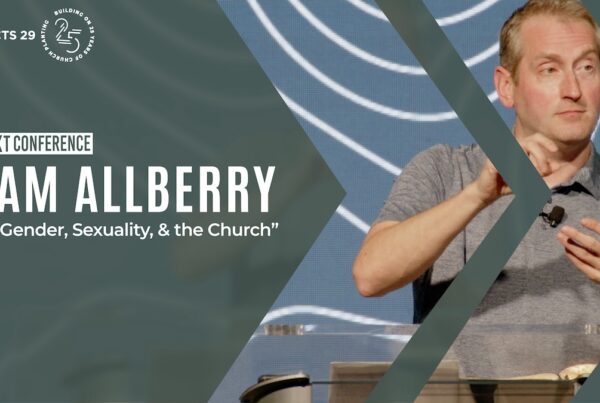Popular agnostic Bart Ehrman, religious studies professor at UNC Chapel Hill, starts one of his courses with a class exercise.1 He begins, “How many of you believe that the Bible is the inspired Word of God?” According to professor Ehrman, the majority of students at UNC raise their hands. Then he asks, “How many of you have read [and he will select a popular novel]… The Hunger Games by Suzanne Collins?” Usually, every hand goes up across the room, with only a few exceptions. Ehrman follows with a third question, “How many of you have read the entire Bible?” And virtually no one raises his or her hand. Then comes Ehrman’s punch. He inquires, “Now I can understand why you would read Collins’ book. It’s entertaining. But, if you really believed God wrote a book, then wouldn’t you want to read it?” Ehrman thus exposes the inconsistency with what these students say and with what they do.
If God wrote a book, then shouldn’t you want to preach it?
We show what we believe about the Bible by how we use the Bible – not merely by what we say about the Bible. When it comes to preaching, we show what we believe about the Bible by how we use the Bible in the pulpit. A high view of the Bible should lead to substantive, biblical preaching. Paul moves from the doctrine of the inspiration of Scripture in 2 Timothy 3:16-17 to the command to preach it in 2 Timothy 4:1. It’s a natural transition. If God wrote a book, then shouldn’t you want to preach it?
A Renewed Vision of Preaching
What’s more troubling to me than the negative vibe toward preaching today outside the church is the fact that many seminary students are pessimistic about “preaching.” When asking classes, “How many of you want to preach weekly in a local church?” the numbers are usually low. When I was in seminary, professors would try to talk guys out of preaching, but now we’re trying to talk them in to preaching!
Now I understand that the term “preaching” can be used in a variety of contexts. Sidney Greidanus points out that the New Testament uses “as many as thirty-three different verbs to describe what we usually cover with the single word preaching.”2 Indeed, there’s a wide array of ways to make disciples by expounding the Scriptures – in villages, in coffee shops, in classes, in homes, in the marketplace, etc (cf. Acts 8:4). I get it. I promote it. Many who are making disciples as campus ministers, village evangelists, or marketplace ministers are heroes. I’m not discounting these ministries at all. What’s more, I think pastors should make disciples in these types of contexts from time to time as well. But still, pastors of churches should value and treasure the opportunity to preach the Word weekly, in the context of the corporate assembly of the local church (1 Tim 4:13). And it’s at this point that we find many students shirking back not merely from preaching but from the pastorate and the local church. Many don’t have a high view of the church, and they don’t have an aspiration to pastor.3
While I certainly don’t want to push the wrong guys into the pastorate, I do want to encourage those who aspire to pastoral preaching, to own it, and be devoted to it. The fact is we are in desperate need of a new generation of preachers who are passionate about preaching the gospel. The late British preacher Martin Lloyd-Jones said: “What is it that always heralds the dawn of a Reformation or of a Revival? It is renewed preaching. Not only a new interest in preaching but a new kind of preaching.”4 We need to raise up millions of faithful, Christ-centered, people-loving, expositors that expound the Word with accuracy and freshness; not ten more sensational conference speakers who say the same things at different events.
How might this happen? Let me mention a few needs.
We must first reaffirm our belief in the power of the preached Word.
There seems to be a real absence of this belief. How many church conferences have you attended where little to nothing was said about preaching? Recently at a major church planting conference, with thousands in attendance, and numerous breakout sessions offered, there was one session on preaching. One! Might I suggest the need emphasize preaching if you’re emphasizing church planting? I realize that in the early days of a church plant, your weekly focus should be on evangelism and mission, not 20 hours of sermon preparation, but preaching is vitally important. Find a young church plant that’s thriving, and you will most likely find faithful and effective preaching there.
You can build a crowd by personality. But you can only build a church by the Word.
In place of an emphasis on the preached Word, there’s an unrelenting emphasis on church growth. While I long for my local church to grow, an unhealthy, idolatrous craving for increased numbers must be crucified. Our job is not to draw a crowd, but to preach the Word. We must remember that a crowd doesn’t equal a church. Muslims draw crowds. Disney World attracts millions. So do the Golden State Warriors. What’s the difference? It’s this: God builds his church by his Word. You can build a crowd on personality, marketing, or other flesh-feeding attractions, but you can only build a church by the Word. God brings us to life through the living Word of God, sustains us by his Word, and matures his people by his Word – as the Spirit works through this divine process. So what are we trying to build? If you want to build a church, do not abandon the Bible, but “preach the Word!” (2 Tim 4:2). Herald the Gospel from the Scriptures!
Next, we must pray for the Lord of the church to grant this movement.
A renewal of preaching comes from the work of the Spirit.
Finally, we need to inspire others by our example.
We must inspire, emphasize, exemplify, and instruct people in the skill of engaging pastoral preaching.
In William Perkins’ classic work The Calling of the Ministry, the Puritan lamented the “scarcity of true ministers” saying that “good ministers are one in a thousand.”5 He encouraged Christians to realize the importance of good schools and seminaries in order to help raise up competent pastors. Then he said something even more striking. He put the burden on pastors. He said: “Let each minister both in his teaching and his conversation work in such a way that he honors his calling, so that he may attract others to share his love for it.”6 In other words, to attract others to pastoral preaching, we must not settle for mediocrity in the pulpit and in the pastorate. We must inspire, emphasize, exemplify, and instruct people in the skill of engaging pastoral preaching.
There’s a whole lot more to local church ministry than preaching, but we don’t need to water-down our emphasis on this ministry, but should instead pray for God to light a preaching fire in the hearts of many, and for others of us to pour gasoline on these fires.
1 I have heard Ehrman use this illustration in public debates. I have also had seminary students tell me about being in Ehrman’s class and participating in this exercise personally.
2 Sidney Greidanus, The Modern Preacher and the Ancient Text (Grand Rapids: Eerdmans, 1988), 6.
3 Portions of this blog will appear in my chapter of The SBC and the 21st Century (Nashville: B&H, 2016).
4 D. Martyn Lloyd Jones, Preaching & Preachers. 40th anniversary edition (Grand Rapids: Zondervan, 2011), 31
5 William Perkins, The Art of Prophesying with The Calling of the Ministry, reprint (Carlisle: The Banner of Truth Trust, 2002), 96.
6 Ibid., my emphasis.










